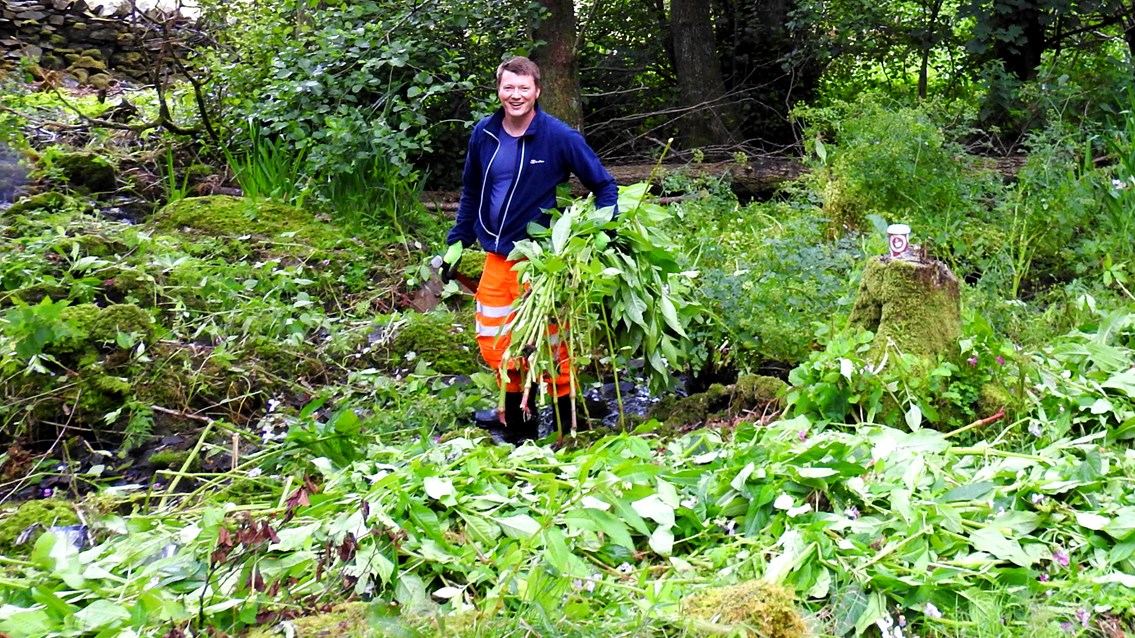Wednesday 26 Aug 2020
Volunteers help stop one of UK’s most invasive plants from ravaging Cumbrian beauty spot
- Region & Route:
- North West & Central
- | North West & Central: North West
Volunteers from Network Rail are helping to stop destruction on a river in Cumbria by Himalayan balsam - one of Britain’s most invasive alien plant species.
The non-native weed, which has a stronghold on local rail embankments, risked infesting a beauty spot in Troutbeck and on the River Kent in Kendal before the volunteer railway workers joined forces with the South Cumbria Rivers Trust (SCRT).
Growing rapidly, the Himalayan balsam was spilling from the railway onto the riverbank, suppressing native plant growth and threatening the recently created natural flood defences.
SCRT built the natural defences by stacking logs and building dams to reduce flooding risk. To monitor the project’s success, CCTV was installed. The infestation of Himalayan balsam meant the view of the CCTV was obscured.
Matthew Thomas, an ecologist at Network Rail who took part, said: “Usually the South Cumbria Rivers Trust has to call in specialist contractors to do all their Himalayan balsam clearance, so we were happy to use our volunteer leave to lend our graft and knowledge, and help reduce these costs.
“This invasive plant is a huge blight on the railway and native biodiversity in general so anything we can do to share best practice and slow the spread in areas of natural beauty like the River Kent and Troutbeck is the least we can do.”
Riverbanks, railways and waste land are the perfect breeding ground for Himalayan balsam to spread rapidly.
It greedily gets an early start in spring and quickly shades out native plants so that by summer it has often taken control of the entire habitat.
Each plant has pods containing more than 500 seeds each which then explode in the autumn, allowing new plants to set root up to seven metres away.
Jayne Wilkinson from the South Cumbria River Trust, said: "As a small charity we work closely with partners and volunteers to deliver benefits across South Cumbria, therefore we were grateful when Network Rail got in touch saying they would like to help out on a volunteering day.
“We had the perfect site for them alongside a section of railway line in Kendal where Himalayan Balsam has spread rapidly, with the team doing a good job of ‘pulling’ the balsam on the day to clear neighbouring land. Although still an issue at the site, with on-going control required, it is good to see some progress being made to help to protect our local biodiversity.”
Thanks to the SCRT and the work of the volunteers, Himalayan balsam has been almost eradicated from the River Kent.
This involved what’s known as ‘balsam bashing’ – pulling up the invasive weed before its seed pods are big enough to burst.
Notes to Editors
- Himalayan balsam was introduced to the UK 150 years ago as an ornamental plant, but quickly spread into the wild.
- Each plant can have more than 500 seeds per pod. When the seed pods are ripe in the autumn, the slightest touch causes them to burst open catapulting and dispersing the seeds up to 7m away.
- It is often found growing along rivers, disused railway lines or in similar linear corridors.
- It is one of the most invasive species in the UK as it dominates habitats, grows densely and shades out native plants
Contact information
Passengers / community members
Network Rail national helpline
03457 11 41 41
Latest travel advice
Please visit National Rail Enquiries
Journalists
Network Rail press office - North West & Central Region
0330 854 0100
NWCmediarelations@networkrail.co.uk
About Network Rail
We own, operate and develop Britain's railway infrastructure; that's 20,000 miles of track, 30,000 bridges, tunnels and viaducts and the thousands of signals, level crossings and stations. We run 20 of the UK's largest stations while all the others, over 2,500, are run by the country's train operating companies.
Usually, there are almost five million journeys made in the UK and over 600 freight trains run on the network. People depend on Britain's railway for their daily commute, to visit friends and loved ones and to get them home safe every day. Our role is to deliver a safe and reliable railway, so we carefully manage and deliver thousands of projects every year that form part of the multi-billion pound Railway Upgrade Plan, to grow and expand the nation's railway network to respond to the tremendous growth and demand the railway has experienced - a doubling of passenger journeys over the past 20 years.
Follow us on Twitter: @networkrail
Visit our online newsroom: www.networkrailmediacentre.co.uk

